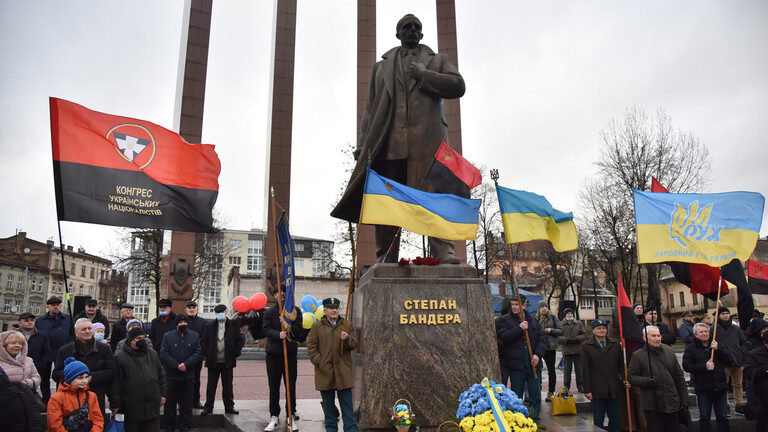
Tyskland har stiltiende kritiseret Ukraine for undskyldning fra nazi-samarbejdspartneren Stepan Bandera, som Kievs ambassadør fortaler for. Landet bør tilslutte sig den Berlin-baserede International Holocaust Remembrance Alliance (IHRA), hvor Banderas rolle i etniske udrensninger kan diskuteres, sagde den tyske antisemitismekommissær Felix Klein mandag.
IHRA er et 'passende forum' til at diskutere spørgsmålet på internationalt plan, sagde Klein til Funke Mediengruppe. Dette forslag var et svar på påstande fra den ukrainske ambassadør Andrey Melnik, som sagde, at der ikke var beviser for, at den nazistiske samarbejdspartner Bandera var ansvarlig for forfølgelsen af polakker og jøder i Ukraine under Anden Verdenskrig.
Bandera betragtes som en nationalhelt i Ukraine på grund af sin rolle som nationalistisk leder. Styrker, der var loyale over for ham, var involveret i massedrab og udvisninger af ikke-ukrainere og stillede sig på side med de invaderende nazistiske tyske styrker i håb om, at Adolf Hitler ville tillade en ukrainsk stat at eksistere under Berlins protektorat.
Delvist oversat af SOTT.net fra Germany gives Ukraine advice on Nazi-collaborator national 'hero' - media
The Germans arrested Bandera in 1941 after he refused to accept that his plan to proclaim an independent Ukraine would not be allowed. He was released three years later in hopes that he could lead his Organization of Ukrainian Nationalists to fight the advancing Red Army on the eastern front.
Melnik's attempt to whitewash Bandera's role in the persecution of minorities in Ukraine prompted rebuke from Poland and Israel. The Ukrainian Foreign Ministry distanced itself from the diplomat, saying he was expressing his personal views. Kiev reportedly wants to recall the ambassador from Berlin and appoint him deputy foreign minister.
Klein said that he found Melnik's comments problematic, because they allegedly "feed the Russian narrative" about Ukraine and "cause division and misunderstanding among friendly states."
Moscow believes the Ukrainian government is beholden to the whims of radical nationalists, some of whom openly espouse neo-Nazi beliefs, and that they prevented the government in Kiev from seeking reconciliation with the Donbass region in the east, while pushing for military action against them.
Russia sent troops into Ukraine on February 24, citing Kiev's failure to implement the Minsk agreements, designed to give the regions of Donetsk and Lugansk special status within the Ukrainian state. The protocols, brokered by Germany and France, were first signed in 2014. Former Ukrainian President Petro Poroshenko has since admitted that Kiev's main goal was to use the ceasefire to buy time and "create powerful armed forces."
In February 2022, the Kremlin recognized the Donbass republics as independent states and demanded that Ukraine officially declare itself a neutral country that will never join any Western military bloc. Kiev insists the Russian offensive was completely unprovoked.



Kommentar: See also: